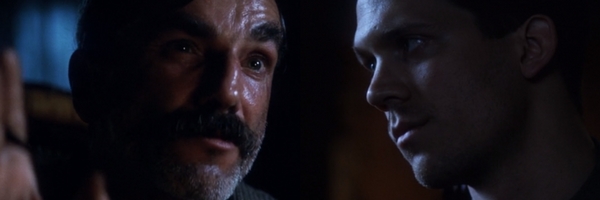There Will Be Blood
Fatherhood
About midway through the film, he says, “I have a competition in me. I want no one else to succeed.” This is the admission that ultimately foreshadows his final confrontation with H.W. and the dissolution of their relationship. When we flash forward again, H.W. is now a grown man and married, ready to take what he’s learned from his father and form his own company. This trope, of son separating from the father and ultimately leaving the father feeling betrayed, is given new life in P.T. Anderson’s hands, though. Daniel’s empire wasn’t built for H.W. He built it for himself, and has seen his son as his partner in it more or less since its inception. So the betrayal he feels is less about a loss of legacy, and more about abandonment.
In Daniel’s mind, if his son is not with him, then he’s against him. There is no middle ground, and there is no room to presume that Daniel could ever allow his son’s company to exist, let alone succeed. We get the sense that Daniel won’t just turn his back on his son, but that he’ll do everything in his power to destroy him as the competition.

And it’s after this moment, just after Daniel tries to convince himself that he never loved his son anyway (something we know without a doubt to be a lie), Eli Sunday reappears. Eli Sunday, the man that has not only stood in strange opposition to Daniel, but the man that forced him to admit the central flaw in his relationship with H.W.—that he abandoned his child when he sent him away all those years ago.
All of this is what brings us to the film’s bloody end. It’s an eruption of anger and even self-hatred as here, in his most painful and vulnerable moment, the living reminder that this pain may be his own fault appears at his doorstep. Rage at the memory of admitting aloud how he’d failed his son in the exact moment where he may have lost him forever pushes him to recreate the scene. It’s as if he’d been holding on to the pain of that moment all these years—decades—later, letting it fester until it could only explode at this most volatile instant. And as he kneels over Eli’s body, he is finally (as the last line of the movie states so clearly) finished. He is truly alone, as he once wished to be, with no family left at his side, no blood ties. Just blood.
I felt bit difficult to understand this especially last paragraph can someone explain it easily?



